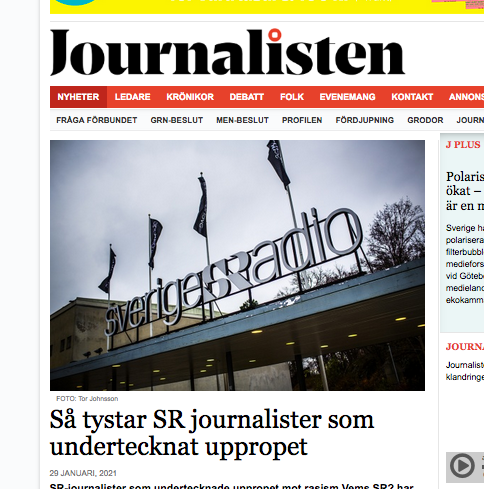1) Awful story from Sweden. In September, journalists at public broadcaster Swedish Radio (SR) signed statement demanding better coverage of racism/discrimination & called out racism/discrimination within SR itself.
SR responded by banning a number of them from covering racism.
SR responded by banning a number of them from covering racism.
2) In September of 2020, a group of journalists – most with immigrant backgrounds – at public service broadcaster Swedish Radio signed a statement: ”Whose SR? A Call for Representation and Against Racism at Swedish Radio.” The statement was widely discussed and debated.
3) The statement laid bare problems at Swedish Radio with coverage of race, racism and discrimination in Sweden and abroad. It also outlined examples of racism/discrimination at Swedish Radio itself, and problems with the recruitment and promotion of minority journalists at SR.
4) The conclusion to the statement included a list of demands intended to improve the situation at Swedish Radio. Leadership at Swedish Radio largely dismissed the claims, and a number of journalists in the Swedish press were highly critical of those who signed the statement.
5) In a story just been published in @Journalistense, it is revealed that a number of those who signed the petition were removed from coverage of Black Lives Matter, and issues related to BLM. Why? Because of one reference to BLM at the start of the 2,200-word statement.
6) Because journalists mentioned BLM, management concluded that they had “taken a position” and had compromised their journalistic neutrality. SR also concluded that not only could some not cover BLM, they could also not cover “issues pursued by the BLM movement.” Such as racism.
7) To illustrate the absurdity, after an SR journalist originally sent to the US to cover racism & BLM and the elections signed the statement, she was no longer allowed to cover either issue. There was even a discussion if she could report on economic inequality & Latino voters.
8) In addition to being banned from covering BLM/racism, journalist was told that if an interviewee even mentioned BLM she should edit the comments out afterwards. Or, if it was live, to steer the conversation to another topic. The journalist called this “ethically questionable.”
9) When SR staff signed a #MeToo  statement in 2017, they were banned from reporting on the statement...but were allowed to cover the #MeToo
statement in 2017, they were banned from reporting on the statement...but were allowed to cover the #MeToo  movement and related issues. When asked why there were different standards for the statement on racism, the SR management offered no answer.
movement and related issues. When asked why there were different standards for the statement on racism, the SR management offered no answer.
 statement in 2017, they were banned from reporting on the statement...but were allowed to cover the #MeToo
statement in 2017, they were banned from reporting on the statement...but were allowed to cover the #MeToo  movement and related issues. When asked why there were different standards for the statement on racism, the SR management offered no answer.
movement and related issues. When asked why there were different standards for the statement on racism, the SR management offered no answer.
10) Swedish Radio case illustrates disturbing heights to which demands for “neutrality” can rise. Staff at SR sign statement with concerns about poor coverage of racism, and possible racism at SR, and are then banned from covering the very issues about which they are concerned.
11) When issues of racism/discrimination highlighted, many of the staff were banned from covering racism, playing on prejudice that minority reporters can't cover minority issues “objectively." This is a position never applied to white reporters covering white people...or anyone.
12) Most disturbing part is idea that there even exists a position of “neutrality” or "balance" in the coverage of overt racism. It is cases like this that highlight how slavish obsession with neutrality can be counter-productive. Much to be said, and far to go, on these issues.
13) Here is the original statement from the journalists. https://vemssr.wordpress.com/
14) And here is the story in @Journalistense revealing what happened to many of those who signed. https://www.journalisten.se/nyheter/sa-tystar-sr-journalister-som-undertecknat-uppropet

 Read on Twitter
Read on Twitter




